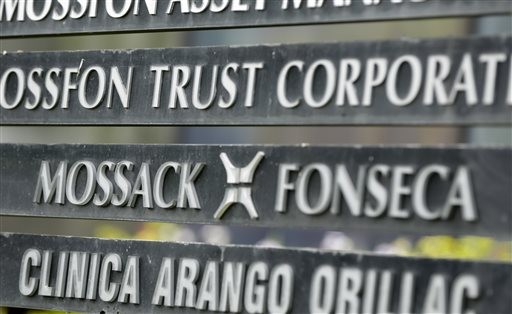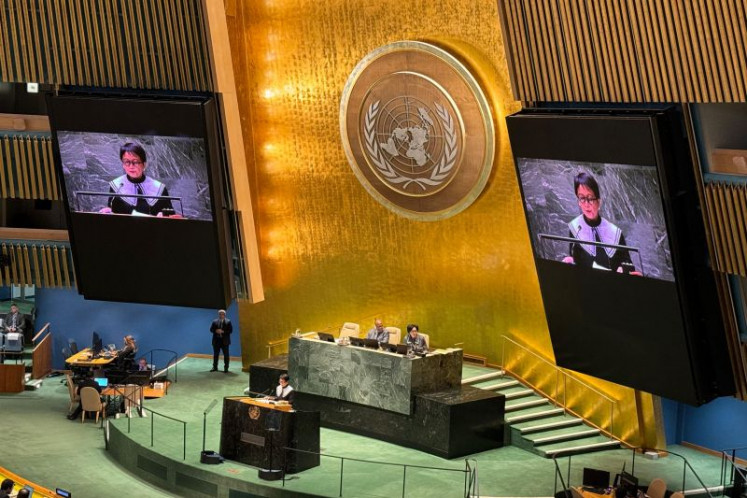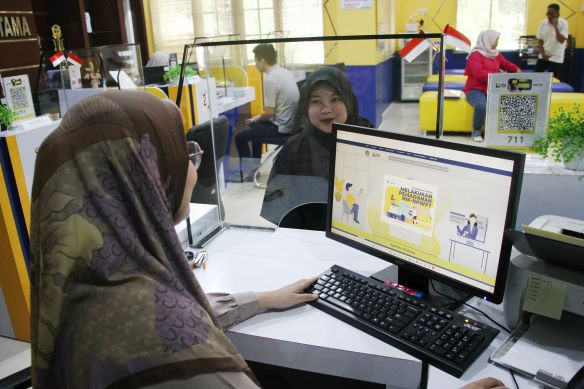Four mechanisms for corporate transparency
The practice of using corporate shells in tax havens is not in itself illegal. Nevertheless, they are often frowned upon by authorities for “jurisdiction shopping”.
Change Size
 A marquee on a building in Panama City, Panama, lists the Mossack Fonseca law firm, one of the leaders in setting up offshore bank accounts for the rich and powerful, April 4. (AP/Arnulfo Franco, File)
A marquee on a building in Panama City, Panama, lists the Mossack Fonseca law firm, one of the leaders in setting up offshore bank accounts for the rich and powerful, April 4. (AP/Arnulfo Franco, File)
A
lthough the data has not yet been released, we have begun to hear the names of politicians, officials and candidates for political office mentioned in the Panama Papers. This wouldn’t have occurred if we had a solid mechanism in place for corporate transparency.
The practice of using corporate shells in tax havens is not in itself illegal. Nevertheless, they are often frowned upon by authorities for “jurisdiction shopping”. This article suggest that it is incomplete to picture the whole Panama Papers controversy only from the point of view of tax evasion or tax avoidance — the real issue behind all this is actually corporate transparency.
Offshore jurisdictions are not selected only because of their tax treatment, but also because they facilitate anonymity and secrecy of company ownership. For example, several jurisdictions allow the use of bearer shares that are not registered. The G20 High-Level Principles on Beneficial Ownership Transparency have committed to prohibiting bearer shares. Another “necessary” element in choosing offshore jurisdiction would be that the host state does not recognize foreign court judgments. This is necessary in order to protect assets from foreign intrusion, in that parties wishing to execute a judgment may need to resubmit the case to a local court.
Some jurisdictions also provide secrecy. The Panama Private Interest Foundation Law 25/1995 is well known for guaranteeing confidentiality. The law requires the foundation’s organs, public servants and private sector employees to maintain secrecy and confidentiality of the foundation’s activities, transactions and operations at all times.
Masquerading ownership of a corporation serves various purposes. Tax is, of course, one thing, but consider also the implications for business competition in situation where various companies are in fact owned by the same party through various corporate shells. Money laundering is also a big deal. Politicians and public officials who control shell corporations offshore could receive various profits and commissions from vendors as a result of political lobbying or regulatory capture.
A simple note however, is that efforts to masquerade ownership do not come only from offshore structuring. There are various cases in Indonesia, especially in the extractive industries such as mining, which utilizes “nominee” shareholders. In this respect, in order to protect their reputation and shield liability, public officials or politicians control mines although they do not directly own shares in mining companies.
They do so through a series of contracts in which they pay fees to individuals to have their names listed as shareholders but then all sort of dividends and profits are transferred from the shareholder to them. They will also be granted a proxy by the shareholders to control the company.
What sort of disclosure mechanism must then be employed? There are at least four disclosures that should be made mandatory:
The first is disclosure of ultimate ownership. Ultimate ownership is the identity of an actual human who owns the share of a company. When companies are structured in multiple layers of special purpose vehicles, it can be difficult to pin down who actually owns them. Legal documentation which is provided onshore often does not reach up to the ultimate owner.
The second is disclosure of beneficial ownership. Ultimate ownership is often inadequate as the real owner may be covered by various mechanisms of control, such as nominee arrangements as discussed earlier or a trust in general. Thus, the concept of beneficial ownership covers not only ultimate owners but also other mechanisms of control. The new EU Fourth Money Laundering Directive 2015/849 obligates companies in all EU countries to identify all parties in trusts and foundations. Together with the first mechanism, these are usually called the disclosure of ultimate-beneficial ownership.
The third mechanism is due diligence on politically exposed persons ( PEP ). Depending on the risk factor, the EU’s Fourth Money Laundering Directive requires proper care when dealing with PEP whose definition include heads of state and heads of government, ministers and deputy or assistant ministers, members of parliament, members of the governing bodies of political parties and members of supreme courts, constitutional courts or other high-level judicial bodies.
The directive requires entities to exercise due diligence when engaged in a business relationship with PEPs including obtaining senior management approval, taking adequate measures to establish the source of wealth and monitoring the relationships.
The fourth mechanism is disclosure of interest. In various jurisdictions worldwide, members of state institutions — the parliament, state audit agency, supreme and constitutional courts, regulatory bodies, members of the Cabinet, governors, mayors and councilors — are required to disclose their interests. The disclosure covers any past interests ( consultancies, share ownership, directorship ) and present interests ( fees received — up to a certain amount — shareholding, beneficial interests such as insurance or in trusts ). The disclosure also covers interests of “affiliated parties” such as a spouse and children.
The disclosure of ultimate-beneficial ownership ( the first and second mechanisms ) should form a part of general corporate law reform. There may be sectoral regulations ( e.g. banking or mining ) that require disclosure of ultimate-beneficial ownership, but this isn’t likely to be effective. Instead, the transparency should be aimed directly at the corporate level. This entails that all companies established in Indonesia should be obliged disclose their ultimate-beneficial owners and regularly maintain and update a register.
The legal entity administration system at the Directorate General of General Legal Administration can be mandated to create a publicly accessible register of ultimate-beneficial ownership.
In the UK, The Register of People with Significant Control ( PSC ) Regulation, to become effective later this year, will regulate the disclosure and register of beneficial owners. UK companies could be fined and directors could be imprisoned for failing to adhere to this new rule. The same reform should be implemented in Indonesia. This means that everyone should be able to access information on the actual ultimate beneficial owner of a company through a government website.
Since beneficial ownership disclosures have been a subject of the G20, the Financial Action Task Force and UN Convention against Corruption, and have recently been implemented in the EU through the Fourth Money Laundering Directive, it is only a matter of time before international pressure intensifies toward Indonesia for the application of such mechanism.
The third mechanism on PEP has been partially implemented as a part of a know your customer ( KYC ) policy in sectoral regulations, mostly in banking. However, there needs to be improvement of due diligence standards and disincentive mechanisms in order to ensure that such due diligence is being carried out. Furthermore, the KYC application should be extended beyond banks.
The fourth mechanism, the disclosure of interest, goes beyond the disclosure of assets and also includes other sorts of interest, both pecuniary and non-pecuniary. These interests should be disclosed on the websites of institutions: the House of Representatives, local legislative councils, the Supreme Audit Agency ( BPK ), the Constitutional Court, ministries’ websites and so on. Thus, if officials or politicians own mining companies, whether directly or indirectly, or receive fees from companies for their services ( consulting, advisory ), they should be disclosed on their institution’s website.
As such, the fourth mechanism could be enforced as part of sectoral regulations or an ethical code. If the data provided by the official or politician was inaccurate, due to omissions or deliberate intent, there should be ethical rules that call for resignation. The primary purpose of this disclosure would be to prevent conflicts of interest. If conflicts of interest arise, the said politicians or officials should remain absent from making key decisions.
***
The writer is director of the Center for Regulation, Policy and Governance ( CRPG ).
---------------
We are looking for information, opinions, and in-depth analysis from experts or scholars in a variety of fields. We choose articles based on facts or opinions about general news, as well as quality analysis and commentary about Indonesia or international events. Send your piece to community@jakpost.com.








